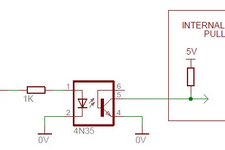Saeedk9574
Member level 3

Hi everyone,
I am working on a GSM SMS relay controller and I have a question about interfacing of digital sensors (like motion detector, smoke detector, and so on) with MCU. When I see the similar boards they have used optocouplers to connect these digital sensors to the microcontroller, however these sensors have a common ground with the controller board. So we wont have isolation with optocoupler because of the common ground. My question is while there is no isolation why we do not use a simple transistor instead of optocoupler?


I am working on a GSM SMS relay controller and I have a question about interfacing of digital sensors (like motion detector, smoke detector, and so on) with MCU. When I see the similar boards they have used optocouplers to connect these digital sensors to the microcontroller, however these sensors have a common ground with the controller board. So we wont have isolation with optocoupler because of the common ground. My question is while there is no isolation why we do not use a simple transistor instead of optocoupler?


